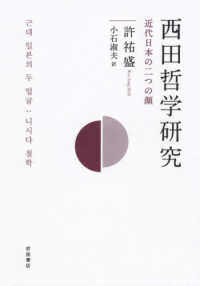알라딘: 근대 일본의 두 얼굴: 니시다 철학


근대 일본의 두 얼굴: 니시다 철학
허우성 (지은이)
문학과지성사 2000-05-08
정가
20,000원
548쪽
책소개
이 책은 ‘생명’과 ‘논리’ 두 개념을 평생 화두로 삼고 사유를 전개한 니시다의 철학에 대한 연구서이다. 니시다 기타로(西田幾多郞, 1870∼1945)는 근대 일본을 대표하는 철학자로 일본 내외에서 널리 인정받아온 인물이다. 이 책에서 저자는 '자각주의와 순수 경험의 철학', '절대무(無)의 자각의 철학', '역사·정치철학'을 니시다 철학의 세 가지 발전 단계로 상정하고 이에 대해 본격적으로 논하고 있다.
니시다는 서양 철학서를 깊이 읽으며, 그가 서양의 대표 논리로 간주했던 ‘일(一)의 다(多)’라는 논리를 비판하고, ‘일즉다(一卽多)’라는 생명의 논리를 창안했다.
그러나 일본이 전쟁에 돌입하게 되자 조국 일본의 운명에 깊이 공감하며 역사철학을 전개해나갔다. 그는 자신의 역사철학에서, 천황과 국체(國體) 그리고 전쟁을 옹호함으로써 일본 국민으로서의 국적성을 가장 노골적으로 드러냈고
서양 제국주의에 대항한다는 명분 아래
대동아 공영권 이념을 철학적으로 지지함으로써 이류 제국주의에 빠지게 되었다.
저자는 이 책에서 개인의 개성, 자유와 창조 행위, 생명의 용출을 주창하며 생명철학을 주장한 동시에 제국주의적 역사철학을 전개한 두 얼굴의 니시다 철학을 분석함으로써 일본이라는 타자를 객관적으로 바라보고자 한다.
====
목차
- 서남동양학술총서
- 근대 일본의 두얼굴:니시다 철학
- 서남 동양학술총서 간행사
- 책머리에















